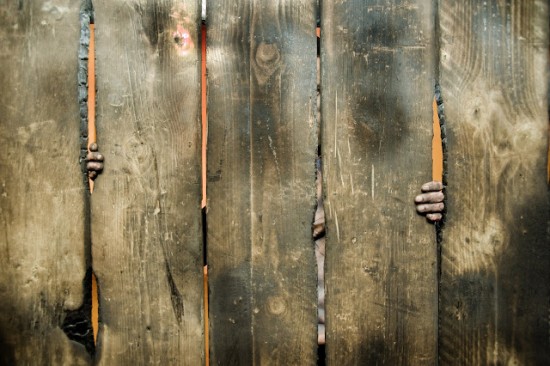Originally published on Spoonfed, March 2012.
There’s a certain irony in the title of Artangel’s latest commission – a piece of appropriately en vogue immersive theatre/performance art by the award-winning Mark Storor. Ostensibly, A Tender Subject concerns itself with homosexuality in UK prisons, how the issue is both repressed and expressed within a complex institutional framework. Look a little deeper though, and A Tender Subject has additional, carefully submerged and widely significant implications.
First though, prison: a place, one imagines, that most people who come to see A Tender Subject over the course of its limited fourteen-night run are unlikely to have experienced first-hand. Our experience of prison is entirely a mediated one, one that arises in the mind through books, films, TV series etc. The chances are, therefore, that it is an unrealistic one, and so Storor’s first task is to give us a taste of what it might be like to be subjected to the machinations of the system.
On arrival at the meeting point our phones are removed and placed in plastic bags, to be returned upon our exit. It’s a small, but note-worthy removal of personal identity – particularly for the Twitter-happy band of eleven journalists at tonight’s press preview. From here, we’re driven in big white security vans to the secret location – what looks like a huge old warehouse in the City. White-shirted security guards mark our route and order us into line with firm precision. We’re instructed inside, down cold concrete steps, past peeling walls. With the slice of an echoing clang, the door slams shut behind us and it begins. In truth, it already had.
Over the course of an hour, we’re marshalled from room to darkened room in this strange, cavernous underground space, emerging periodically into corridors packed with row upon row of blindly screeching neon striplights. There’s large-scale video pieces, strange performances that hint at subsumed violence, moments of surprise, beauty, and a hefty dose of the surreal. By and large, the symbolism is relatively straightforward: food, gardens, hummingbirds, a horse; enclosed spaces as places to escape both from and to. But there’s an emotive power here that ties things together and gives Storor’s work more leeway than, say, Ryan Gander’s Locked Room Scenario (another Artangel commission) or Mike Nelson’s installation for the British pavilion at last year’s Venice Biennale. That leeway comes because the tender subject here is not simply art but also something other, unknown, real.
And this is where the double meaning of the title comes in. Throughout the work, words are written on the walls – “the black queens are the bravest” or “the thought of crying” – but, for me, one word stands out, emblazoned on the vans that bring us here: Serco. “Probably the biggest company you’ve never heard of” according to the Guardian, Serco Group are a private contractor running public services throughout the UK and abroad. They run four prisons, a child detention centre, and two immigration removal centres. They have defence contracts with the RAF; they manage hospitals and border control; they look after the UK’s nuclear warheads; they run the Docklands Light Railway; they manage our Boris Bikes. In short, they are, say the Telegraph, “the company running the country” – all through a frequently criticised public-to-private outsourcing process known as tendering.
This then is the unspoken subject at the heart of Mark Storor’s work – A Tender Subject. That prison represses the identity of the individual – in whatever form that identity might take – is nothing new (one need only read a smattering of Foucault to know that). What has changed of late is the smooth emergence of companies like Serco, who make sizeable profits out of these institutions. Serco’s adjusted operating profit for 2011 was up 12.1% at £290.1million, while the salary of Chief Executive Chris Hyman grew 18% to a whopping £1.86 million.
But how did this happen? What are the implications? And how much do any of us actually know about it? Storor asks us then (deliberately or not, overtly or otherwise) to examine this process of tendering: the relationship between public and private; the appointment of a knighted Air Marshal as Non-Executive Director; the repression not just of prisoners but of staff; the salaries of those at the top and the scandals at the bottom. How many of us know, for example, about the string of frankly disgraceful occurrences at Yarl’s Wood Immigration Removal Centre?
After an hour, we, as mere visitors, are able to leave. Embroidered on the shirt of the final security guard we meet is not the name of his company, Serco, but simply the word at the heart of it all, ‘tender’. Repression, secrecy, the troubled relationship between public and private: these are not just issues for prisoners dealing with homosexuality, but ones that strike at the heart of the way this country is run today. A Tender Subject, indeed.
Mark Storor – A Tender Subject runs until 31st March 2012.
